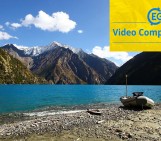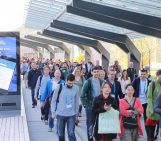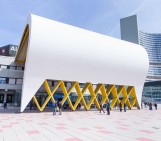
As researchers, we spend a lot of time and energy trying to extend the limits of our scientific knowledge, but how much of our new findings can be translated into policies, and what are the best practices for doing this? A multitude of science-policy-related sessions are scheduled at this year’s general assembly (GA), spanning most of the EGU divisions. This month’s GeoPolicy post highlights a selection of #EGU16 policy-related sessions to help your understanding of the science-policy process. NB: A more comprehensive session list can be found here.
Union Wide Sessions
Union wide sessions are open to all conference participants and have general appeal. The Short Course (SC) entitled ‘Working at the science policy interface’ (SC52, Thursday, 12:15-13:15) is the only session at the GA to focus purely on how scientific research is used to assist the policy process. This session consists of three speakers who will discuss their experiences of science-policy: Katja Rosenbohm (Head of Communications at the European Environment Agency); Panos Panagos (Research Scientist in the Land Resource Management Unit at the European Commission’s Joint Research Centre); and Valérie Masson-Delmotte (Head of the IPCC AR6 Working Group 1 / Laboratoire des sciences du climat et l’environnement).
Some Town Hall Meetings (TM – discussion sessions with a regular timeslot at 19:00-20:00) have particular policy-relevance this year. The first is ‘The Science of Climate Change Communication: Engaging the Public, Policymakers, and Journalists’ (TM6, Monday, Room G2), which aims to ‘introduce major insights, trends, and recommendations from social science research on effective climate change communication’ to the public and policymakers. The speakers are Alan Graubard (Oxford University Press), Matthew C. Nisbet (Northeastern University), and Mike Schäfer (University of Zurich). The other TM of policy-relevance is ‘Soil contributions to the UN-sustainable development goals (SDG)’ (TM3, Thursday, Room G2). This session, hosted by Johan Bouma (Wageningen University, the Netherlands), will discuss how the soil science community can collaboratively contribute to achieving the SDGs. This session is well worth attending to learn more about one of the UN’s premier initiatives between now and 2030.

The Austria Center Vienna by night during the EGU 2015 General Assembly (Credit: EGU/Stephanie McClellan)
Division Sessions
It is often observed that policy-relevant research requires inter-collaborations between different scientific areas. As a result, some of the ‘division’ sessions listed below appear quite trans-disciplinary, and may appeal to participants from outside their traditional research backgrounds.
Energy Resources & the Environment (ERE)
- Energy, Resources & the Environment (ERE1.1, Monday all day, Room 2.31/Hall A). This year, the smaller session entitled ‘ERE and policy’ was merged within ERE1.1, meaning a large selection of policy-focused presentations can be found within this session. It’s worth checking out both posters and oral abstracts. Some highlight abstracts are: ‘An Empirical Study of why our Cognition Toward Environmental Sustainability is Inconsistent with our Behaviour: Policy Implications’ (poster); ‘Environmental aspects of hydraulic fracturing – Main results and recommendations from two studies on behalf of the German Environment Agency’ (oral); and ‘Mineral supply constraints necessitate a global policy response’ (oral).
Hydrological Sciences (HS)
- Water Resources Management and Policy in a Changing World (HS5.6, Monday all day, Room C / Hall A). This session aims at discussing advances in water resource systems analysis, planning and management to inform public policy and other engaged stakeholders. This session includes an Arne Richter Award for Outstanding Young Scientists Lecture by Kaveh Madani, entitled ‘Who to Blame: Irrational Decision-Makers or Stupid Modelers?’.
- Meeting the water needs of a growing global population: groundwater contamination, monitoring, mitigation and adaptation in developing countries (GSL/GSA sponsored session) (HS8.2.11, Monday, 15:30-17:00 & 17:30-19:00, Room 2.44 / Hall A). After the oral presentations a panel discussion is arranged to stimulate dialogue about how researchers and wider communities should sustainably meet the demand for potable water in developing countries. In addition to the discussion, the oral presentation entitled ‘Groundwater sustainability and urban development – a major challenge for the 21st century’ looks of particular policy relevance.
Natural Hazards (NH)
- Natural Hazards Education, Communications and Science-Policy-Practice Interface (SMP) (NH9.3, Monday 08:30-10:00, PICO1). This session focuses on the best practices of communicating natural hazard scientific research. As this session is a PICO, you can get a ‘taster’ of all the presentations during the ‘2-minute-madness’, then learn more about your favourite presentations at the interactive-poster session afterwards.
- Monitoring and modelling of dangerous phenomena, and innovative techniques for hazard evaluation and risk mitigation (NH9.9, Thursday 08:30-12:00 & 17:30-19:00, Room N2 / Hall D). Although this session is more research focused, the oral presentation entitled ‘Near Earth Objects and Cascading Effects from the Policy Perspective: Implications from Problem and Solution Definition’ will provide a policy viewpoint to assessing hazards originating from outside the Earth.
Soil System Sciences (SSS)
- Soil Erosion, Land Use and Climate Change: mapping, measuring, modelling, and societal challenges (SSS9.10/GM6.7, Friday, 08:30-12:30 & 17:30-19:00, Room -2.32 / Hall X1). There is an increasingly important consensus on soil’s value as a productive resource and basis of ecosystems.This session aims to provide a platform for the discussion of the common issues surrounding soil science, the datasets, methodologies and the perspectives of their development. Highlight presentations of policy-relevance include ‘Management of fire affected areas. Beyond the environmental question’ (oral), ‘The impact of climate change and sustainable land management based adaptation on hydrology and soil erosion of a large semiarid catchment’ (oral) and ‘Forecast of muddy floods using high-resolution radar precipitation forecasting data and erosion modelling’ (poster).
In addition to this blog post there is a more comprehensive list of the policy-relevant sessions at EGU16 available here.
To find more sessions of interest search the online programme on the EGU website. If you’re a first-timer at EGU then this guide will tell you everything you need to know!
Edit: This post was edited to reflect a change in speakers in the ‘Working at the Science Policy Interface’ session.




